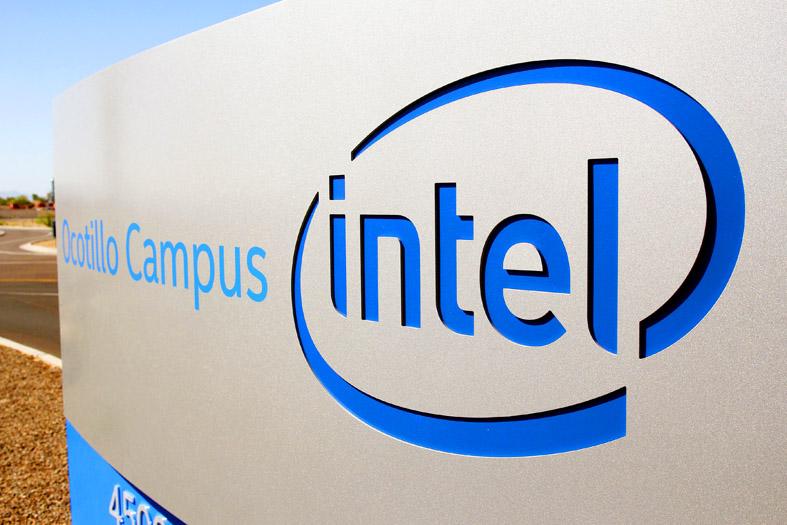Intel Corp on Wednesday dodged another multibillion-dollar damage award after a federal jury in Texas cleared it of claims it was infringing patents formerly owned by NXP Semiconductors NV on ways to speed up computers.
Intel does not infringe two patents owned by closely held VLSI Technology LLC, according to the federal jury in Waco, Texas. The trial was held in the same courthouse where a different jury last month told Intel to pay VLSI US$2.18 billion over other patents.
This was the second of three trials in suits VLSI lodged against Intel over patents that until early 2019 were owned by Dutch chipmaker NXP Semiconductors. A third trial, also before US District Judge Alan Albright, is scheduled to begin in June.

Photo: Reuters
In the most recent trial, VLSI was seeking US$3 billion in damages, saying the inventions were critical to Intel’s ability to make chips faster and with fewer energy requirements. That is more than 3,000 times what the patents were valued at in past acquisitions, Intel’s lawyers said.
Intel denied using any of the inventions, saying its own engineers have spent decades developing the chips that are used in everything from laptops to military fighter planes. It also said that the patents did not cover new ideas even two decades ago, when they were issued.
VLSI was seeking damages for a period beginning March 1, 2019, just before the suit was filed. One of the patents, issued in 2002, expired in November last year, while the other was issued in 2003 and expires next month, according to data compiled by Bloomberg Law.
Intel reported US$20.9 billion of net income on US$77.9 billion of revenue last year.
VLSI was created in 2016 by the Softbank Group Corp-owned Fortress Investment Group, according to an antitrust lawsuit Intel and Apple Inc filed against Fortress.
Fortress has “deployed patents in waves of lawsuits against their targets without regard for the merits of the claims,” Intel and Apple said in the complaint, which is pending in a federal court in California.
A federal judge had initially tossed the antitrust case, but Apple and Intel amended their complaint a week after the US$2.18 billion verdict, arguing that trial and VLSI’s demand for billions more over other patents is evidence of Fortress’ anticompetitive activities.
Fortress is to respond by Monday.
VLSI has no products and its only potential revenue is its litigation against Intel. VLSI lawyer Morgan Chu of Irell & Manella told the jury not to be distracted by that issue.

TECH BOOST: New TSMC wafer fabs in Arizona are to dramatically improve US advanced chip production, a report by market research firm TrendForce said With Taiwan Semiconductor Manufacturing Co (TSMC, 台積電) pouring large funds into Arizona, the US is expected to see an improvement in its status to become the second-largest maker of advanced semiconductors in 2027, Taipei-based market researcher TrendForce Corp (集邦科技) said in a report last week. TrendForce estimates the US would account for a 21 percent share in the global advanced integrated circuit (IC) production market by 2027, sharply up from the current 9 percent, as TSMC is investing US$65 billion to build three wafer fabs in Arizona, the report said. TrendForce defined the advanced chipmaking processes as the 7-nanometer process or more

China’s Huawei Technologies Co (華為) plans to start mass-producing its most advanced artificial intelligence (AI) chip in the first quarter of next year, even as it struggles to make enough chips due to US restrictions, two people familiar with the matter said. The telecoms conglomerate has sent samples of the Ascend 910C — its newest chip, meant to rival those made by US chipmaker Nvidia Corp — to some technology firms and started taking orders, the sources told Reuters. The 910C is being made by top Chinese contract chipmaker Semiconductor Manufacturing International Corp (SMIC, 中芯) on its N+2 process, but a lack

NVIDIA PLATFORM: Hon Hai’s Mexican facility is to begin production early next year and a Taiwan site is to enter production next month, Nvidia wrote on its blog Hon Hai Precision Industry Co (鴻海精密), the world’s biggest electronics manufacturer, yesterday said it is expanding production capacity of artificial intelligence (AI) servers based on Nvidia Corp’s Blackwell chips in Taiwan, the US and Mexico to cope with rising demand. Hon Hai’s new AI-enabled factories are to use Nvidia’s Omnivores platform to create 3D digital twins to plan and simulate automated production lines at a factory in Hsinchu, the company said in a statement. Nvidia’s Omnivores platform is for developing industrial AI simulation applications and helps bring facilities online faster. Hon Hai’s Mexican facility is to begin production early next year and the

Who would not want a social media audience that grows without new content? During the three years she paused production of her short do-it-yourself (DIY) farmer’s lifestyle videos, Chinese vlogger Li Ziqi (李子柒), 34, has seen her YouTube subscribers increase to 20.2 million from about 14 million. While YouTube is banned in China, her fan base there — although not the size of YouTube’s MrBeast, who has 330 million subscribers — is close to 100 million across the country’s social media platforms Douyin (抖音), Sina Weibo (新浪微博) and Xiaohongshu (小紅書). When Li finally released new videos last week — ending what has